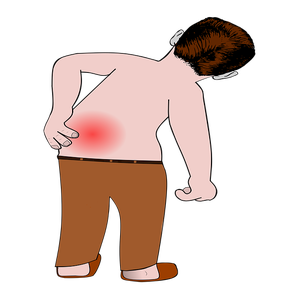

We’ve all experienced back pain at some point, which can range from a nagging ache to excruciating pain.
The main symptoms of back pain is usually an ache or pain anywhere in the back and sometimes, all the way down to your legs and buttocks. Sometimes, back pain can even reach other parts of your body, depending on the cause.
Your back is made up of structures of ligaments, muscles, tendons, disks and bones. All work together to help you move around and if any are damaged, back pain could be a result.
Common culprits include injuries, medical conditions, poor posture and strain. As you get older, you’re more likely to experience back pain if you aren’t careful. Back pain is common and easily treatable, but sometimes, it can be a warning sign for other conditions.
More than back pain
In some cases, back pain, along with other symptoms, point to a life-threatening condition. It’s important to remember that even if back pain isn’t intensely painful, it can still indicate a serious condition. Sometimes, serious conditions come with the least painful aches.
Some signs that you should see a doctor immediately include:
Cauda equine syndrome
If you struggle to hold in urine, feel weakness or numbness in your hips, crotch and legs, you should see your doctor immediately. These symptoms could point to a condition called cauda equine syndrome. It’s usually caused if the nerve sac in the lower spine is severely compressed. It could create severe spinal damage over time.
Cancer
Cancer wreaks havoc all over the body, but severe back pain could mean a tumour has developed in or near your spine. This kind of pain grows steadily and feels worse if you do anything that involves weights. At night, the pain may become worse. If you experience other signs like unexplained weight loss and loss of appetite, it could point to cancer.
Spinal infection
This is difficult to detect, so it’s important to pay attention to the signs. This kind of back pain is usually tender which grows into a deep, constant pain. This may be accompanied by a fever and other illness. In rare cases, spinal infections can cause an epidural abscess to develop (a pus-filled cavity). This abscess presses on the nerve structures in your cervical spine (neck) and thoracic spine (upper back). The pressure could damage your gross motor functions and result in paraplegia (leg paralysis) or even quadriplegia (paralysis of all the limbs).
Abdominal aneurysm
This happens when a large artery next to the spine balloons. The kind of back pain you experience with these conditions feels throbbing. People at risk for heart disease and who have diabetes are most at risk. Quick onset lower back pain with no obvious cause could be a symptom of the enlargement of the aorta (large artery) in your abdomen. This is called abdominal aortic aneurysm.
Ankylosing spondylitis
If your back pain has become long-term and started way before you’re middle-aged, it could mean ankylosing spondylitis (inflammatory arthritis of the spine and pelvis). The back pain associated with this condition progresses over time. It’s more common in men.





 Publications
Publications
 Partners
Partners














